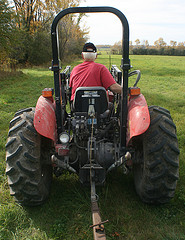Older farmers work fewer hours than their younger counterparts but spend proportionally more time operating heavy machinery and equipment.

Photo credit: A farmer in Pefferlaw, Ontario; Bill Barber on Flickr
Older farm workers are more likely to be injured while using machines than their younger counterparts, says a new Canadian study.
“The study concluded older farmers work fewer hours than their younger counterparts but spend more time operating heavy machinery and equipment,” says a post in the Ponoka News, which I learned about via enews from the Canadian Agricultutral Safety Association.
“Older farmers disproportionally retain tasks involving machinery as they age. The proportion of time spent operating machinery increases 40 per cent in older age groups,” reads the Ponoka News post. “…the machines they’re using are usually the oldest on the farm.”
Dangers of farming
Kenda Lubeck – farm safety coordinator for Alberta Agriculture and Rural Development – told me about the risks of this industry last year during the I Have A Role campaign for 2012. She said 18 people die in farm-related incidents each year in Alberta, which is why the new campaign targets emphasizes everyone in the agricultural industry – including parents, farm owners, workers, equipment dealers, and community groups.
“By creating conversation around safety, it may just remind someone to take the time to install ROPS (roll over protective structures) on their tractors or to take that final walk around their equipment before heading out on the job,” Kenda said. “Farm injuries and fatalities are preventable.”
The Alberta Farm Safety Centre reports there were 1,769 agricultural fatalities in Canada from 1990 to 2005. Its website says “agriculture ranks as Canada’s third most hazardous industry” and “in terms of absolute numbers of fatalities, there is no more dangerous occupation.”
Agricultural machines were involved in 70.9% of fatalities.
The “older worker” factor
What happens as we age?
“We don’t see or hear as well,” said WorkSafeBC senior ergonomist Peter Goyert, quoted in the story “Old School” on page 9 of WorkSafe Magazine’s Jan./Feb. 2011 issue. “Our colour perception deteriorates. Our reflexes slow down and we don’t sleep as well. We’re less flexible and our range of motion shrinks. Our bones thin, our balance declines, and we lose muscle and respiratory and cardiovascular function.”
Sigh…
But let’s look on the positive side. I used the term “chronologically gifted” in my post In praise of older workers, quoting NIOSH director John Howard, who spoke on Workers Memorial Day 2011.
“As more and more chronologically gifted workers are on the job, we must be aware of the unique challenges they face, and design our health and safety interventions accordingly,” he said. “No one should face the prospect of injury, illness, exploitation, or death in earning a paycheck.”
Here’s more information on farming safety. Please add any suggestions in the Comments.
Farming safety resources
- Canadian Agriculture Safety Week – March 10 to 16, 2013
- Canada FarmSafe Plan – a guide outlining the steps needed to implement effective farm health and safety practices
- Statistics: Agriculture on the WorkSafeBC website
- Farmer crushed by irrigation reel – a hazard alert from WorkSafeBC



“No one should face the prospect of injury, illness, exploitation, or death in earning a paycheck.”
This is what happens to the men, women and children who work as Alberta’s paid Farmworkers. After 10 years of Stakeholder Consultations in Alberta not one change has been made to protect these vulnerable workers. No Child Labour Laws in Agriculture here. A child of any age may do any dangerous job for pay. No right to a safe workplace, no right to WCB benefits if injured on the job. No workplace Fatality Investigations. We also have no idea how many injuries and deaths befall us as there is no formal reporting system.
Pingback: Supporting older workers as farm equipment evolves | AgSafe